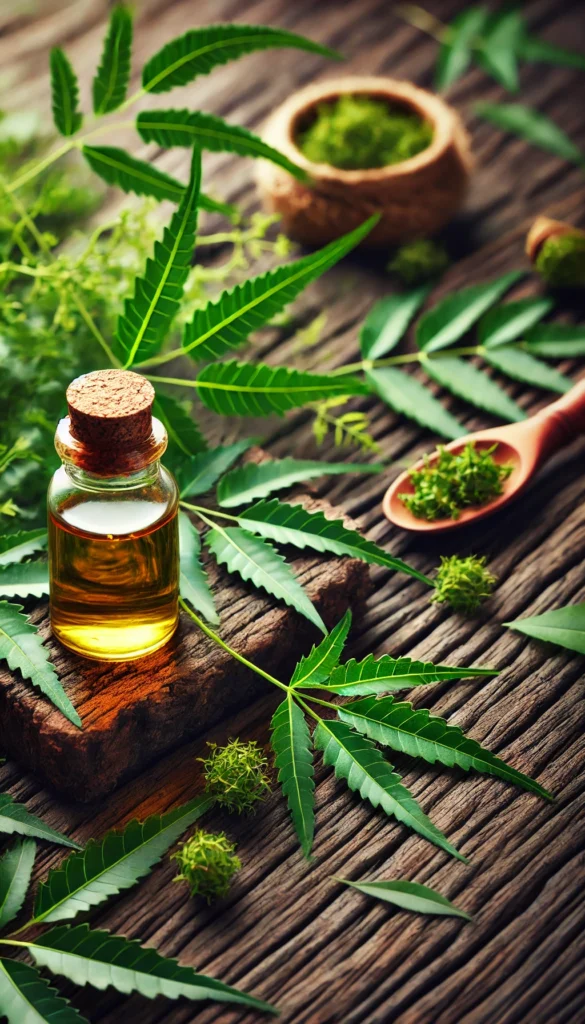Neem, known scientifically as Azadirachta indica, is a tree native to our India and has been a cornerstone of traditional Indian medicine for centuries. In Ayurveda, Neem is revered for its myriad health benefits and is often referred to as “Sarva Roga Nivarini,” which means “the curer of all ailments”.
In modern health practices, Neem has gained global recognition for its potent medicinal properties. Neem leaves, bark, seeds, and oil are used in a variety of health and wellness applications.
From skincare products to dietary supplements, the versatility of Neem is unmatched. Its anti-inflammatory, antibacterial, and antifungal properties make it a go-to natural remedy for many common ailments.
My journey with Neem began when my grandmother introduced me to Neem leaves as a natural remedy for skin issues during my childhood in Kolkata. She would make a paste of fresh Neem leaves and apply it to my skin whenever I had a rash or insect bite.
I remember the immediate relief it provided and the quick healing that followed. This early experience sparked my interest in natural remedies and led me to explore the broader benefits of Neem.
In this article, we’ll explore the numerous health benefits of Neem and Neem Oil, including how they can be used to improve overall well-being.
From boosting immunity to enhancing skin health, Neem has a lot to offer!
Key Takeaways
- Immune System Support: Neem boosts immunity with antibacterial, antiviral, and antifungal properties.
- Skin Health: Neem treats acne, eczema, and other skin conditions with its anti-inflammatory and antimicrobial benefits.
- Oral Health: Neem improves dental hygiene, fights gum disease, and reduces bad breath.
- Detoxification: Neem aids in body detoxification, promoting liver health and cleansing blood.
- Hair Health: Neem oil treats dandruff and promotes hair growth.
- Anti-inflammatory Properties: Neem oil reduces inflammation and relieves pain.
- Neem Oil for Plants: Acts as a natural pesticide and fungicide, supporting plant health.
- Pets: Neem oil treats skin conditions and repels pests in pets safely when used correctly.
- Traditional and Modern Uses: Neem is used in traditional remedies and modern products for comprehensive health benefits.
What is Neem?

Neem, scientifically known as Azadirachta indica, is a tree native to the Indian subcontinent. It belongs to the mahogany family, Meliaceae.
Neem trees are evergreen and can reach up to 30 meters in height. They are incredibly resilient and can thrive in various climates, particularly in arid and semi-arid regions.
In our Indian culture, Neem holds significant importance and has been revered for its medicinal properties for thousands of years. It is commonly referred to as the “village pharmacy” due to its wide range of health benefits.
Every part of the Neem tree—leaves, bark, seeds, fruits, and flowers—has therapeutic uses. In Ayurveda, Neem is used to treat skin conditions, boost immunity, and even cleanse the blood.
During festivals like Ugadi and Gudi Padwa, Neem leaves are often used in rituals and celebrations for their purifying properties.
For me personally, Neem has been a staple in our household for as long as I can remember. We would use Neem leaf paste to treat minor cuts, insect bites, and skin rashes.
Though I never liked the bitter taste of Neem juice that my grandma made us drink every now and then!
Obviously, since I grew up with such traditional practices ingrained in me, its no wonder that I find it so easy to fall back upon them. As I started my own organic farming, Neem became an integral part of my pest control methods, providing an eco-friendly solution to protect my crops.
Refined Oils Vs Cold Pressed Oils
Nutritional Profile and Active Compounds
Neem is packed with a variety of bioactive compounds that contribute to its medicinal properties. The leaves, seeds, and oil of Neem contain essential nutrients and active compounds such as nimbin, nimbidin, nimbolide, quercetin, and azadirachtin. These compounds exhibit antibacterial, antifungal, antiviral, anti-inflammatory, and antioxidant properties .
Neem Oil, extracted from the seeds, is rich in fatty acids like oleic acid, linoleic acid, and palmitic acid.
These fatty acids are beneficial for skin health, helping to maintain the skin’s natural barrier and keep it hydrated.
The oil also contains vitamin E, which acts as a powerful antioxidant, protecting the skin from damage caused by free radicals .
The active compounds in Neem, such as azadirachtin, are particularly effective in controlling pests and insects, making Neem oil a popular choice for natural pesticide. These compounds interfere with the life cycle of insects, reducing their ability to feed, breed, and grow .
Adding Neem and Neem Oil into daily routines can provide numerous health benefits, from boosting immunity to enhancing skin and hair health. The diverse array of nutrients and active compounds in Neem makes it a versatile and valuable addition to natural health practices.
Health Benefits of Neem

Immune System Support
Neem has been traditionally used in Ayurvedic medicine to bolster the immune system. Its leaves, bark, and seeds contain powerful compounds like nimbin, nimbidin, and nimbolide, which have antibacterial, antiviral, and antifungal properties.
These compounds help the body fight off infections and pathogens, enhancing overall immunity. Neem is also rich in antioxidants that protect the body from oxidative stress, which can weaken the immune system over time.
In my own family, we’ve turned to Neem during flu season to keep everyone healthy. I vividly remember the time we made a simple Neem tea by boiling fresh Neem leaves and adding a bit of honey to mask the bitterness.
This tea became a household remedy whenever someone felt the onset of a cold. Its effectiveness in preventing and reducing the severity of illnesses has made Neem an invaluable part of our natural health regimen.
Skin Health
Neem is a miracle worker for skin health, offering solutions for a variety of skin conditions. Its anti-inflammatory and antimicrobial properties make it effective in treating acne, eczema, psoriasis, and other skin issues.
Neem oil, in particular, is known for its ability to soothe irritated skin, reduce redness, and combat bacterial infections that cause acne.
Growing up, my mother would make a Neem leaf paste to apply to our skin whenever we had pimples or rashes. The cooling and healing effects were immediate, and over time, we noticed a significant improvement in our skin health.
Even today, I use Neem oil as part of my skincare routine. A few drops of Neem oil mixed with coconut oil make a perfect natural moisturizer that keeps my skin clear and radiant.
Oral Health
Neem has long been used in traditional Indian practices to promote oral health. Chewing Neem twigs, known as datun, has been a common practice for maintaining dental hygiene.
Neem’s antibacterial properties help fight off harmful bacteria in the mouth, reducing plaque buildup, preventing gum disease, and eliminating bad breath.
Detoxification
Neem is renowned for its detoxifying properties, which help cleanse the body of toxins and impurities.
Its ability to purify the blood, promote healthy liver function, and eliminate toxins through the urinary tract makes it an essential component in detox regimens.
Every spring, we incorporate a Neem detox into our routine to rejuvenate our bodies after the winter months. One of our favorite methods is to drink Neem juice for a week.
Though the taste is quite bitter, the results are worth it. We feel more energetic, and it helps clear up any lingering skin issues, thanks to its purifying properties.
Additionally, Neem supplements, such as capsules or powders, are a convenient alternative for those who find the taste too challenging.
Health Benefits of Turmeric (Haldi)
Health Benefits of Neem Oil
Hair Health
Neem oil is renowned for its numerous benefits for hair health. It is rich in fatty acids, antioxidants, and essential nutrients that nourish the scalp and hair follicles.
One of the primary benefits of Neem oil is its ability to treat dandruff and dry scalp. Its antifungal properties help combat the Malassezia fungus, which is a common cause of dandruff. Additionally, Neem oil has anti-inflammatory properties that soothe the scalp and reduce itching and irritation.
Neem oil also promotes hair growth by strengthening hair follicles and improving blood circulation in the scalp. The high levels of antioxidants in Neem oil protect hair from damage caused by free radicals, keeping it healthy and strong.
Anti-inflammatory Properties
Neem oil’s anti-inflammatory properties make it effective in treating various inflammatory conditions. The compounds in Neem oil, such as nimbidin and nimbin, have been shown to reduce inflammation and swelling.
These properties make Neem oil useful for relieving pain and discomfort associated with conditions like arthritis, muscle aches, and joint pain.
Applying Neem oil to inflamed areas can help reduce pain and promote healing. It penetrates deeply into the skin, providing relief from soreness and stiffness.
Its natural composition means fewer side effects compared to conventional anti-inflammatory medications.
I’ve used Neem oil for pain relief several times. Just warm a little Neem oil and gently massage it into the affected area. The soothing effect is almost immediate, and the pain subsides considerably after a few applications.
It’s now my go-to remedy for any minor aches and pains.
Health Benefits of Amla (Indian Gooseberry)
Neem Oil for Plants
Neem oil is a powerful natural pesticide and fungicide, making it an invaluable tool for gardeners and farmers. Its active ingredient, azadirachtin, disrupts the life cycle of insects by inhibiting feeding, growth, and reproduction.
This makes Neem oil effective against a wide range of pests, including aphids, whiteflies, and spider mites. Additionally, Neem oil helps control fungal infections like powdery mildew and black spot on plants.
Neem oil supports plant health by acting as a preventive measure against pests and diseases. Regular application of Neem oil can enhance plant growth and yield by keeping harmful insects and fungi at bay.
What Plants Not to Use Neem Oil On
While Neem oil is generally safe for most plants, some plants may be sensitive to its effects. Plants with delicate or fuzzy leaves, such as ferns and some succulents, may experience leaf burn or damage when treated with Neem oil.
It’s also advisable to avoid using Neem oil on young seedlings or plants that are already stressed.
Before applying Neem oil to a plant, test a small, inconspicuous area and wait 24 hours to observe any adverse reactions. If the plant shows signs of sensitivity, consider using a diluted solution or opting for alternative treatments like insecticidal soap or horticultural oil.
How to Use Neem Oil on Plants
To effectively use Neem oil on plants, follow these steps:
- Mix the Solution: Combine 2 tablespoons of Neem oil with 1 gallon of water. Add a few drops of mild liquid soap to help the oil mix with water.
- Test First: Spray a small area of the plant and wait 24 hours to ensure there’s no adverse reaction.
- Apply Evenly: Spray the Neem oil solution on all parts of the plant, including the undersides of leaves where pests often hide.
- Timing: Apply in the early morning or late evening to avoid direct sunlight, which can cause leaf burn.
- Frequency: Use every 7-14 days as a preventive measure or every 4-7 days to control an active infestation.
By following these steps, you can safely and effectively use Neem oil to protect your plants from pests and diseases, ensuring healthy growth and bountiful yields.
Neem Oil for Pets

Neem oil is an excellent natural remedy for pets, offering numerous benefits for their health and well-being. It is particularly effective in treating skin conditions and controlling parasites like fleas and ticks.
Neem oil’s antifungal, antibacterial, and anti-inflammatory properties make it a versatile addition to your pet care routine.
For skin treatments, Neem oil can soothe irritation, reduce redness, and promote healing of minor wounds, rashes, and hot spots. It also helps in managing dry skin and dandruff, providing relief from itching and discomfort.
Additionally, Neem oil can be used as a natural insect repellent to protect pets from fleas, ticks, and mosquitoes. Its strong scent and bitter taste deter these pests, keeping your pets safe without exposing them to harsh chemicals.
Is Neem Oil Safe for Dogs?
Neem oil is generally safe for dogs when used correctly, but there are a few important considerations to keep in mind. Always dilute Neem oil before applying it to your dog’s skin.
A common dosage is mixing one part Neem oil with ten parts carrier oil, such as coconut or olive oil. This dilution reduces the risk of skin irritation and ensures safe application.
Before using Neem oil, perform a patch test on a small area of your dog’s skin to check for any adverse reactions. If there is no reaction after 24 hours, it is safe to proceed with a full application. Avoid using Neem oil on open wounds or sensitive areas, such as the eyes and nose.
For flea control, you can add a few drops of diluted Neem oil to your dog’s shampoo. Alternatively, make a Neem oil spray by mixing a few drops of Neem oil with water and a mild liquid soap, then apply it to your dog’s coat.
Always consult with your veterinarian before introducing Neem oil into your pet’s care regimen to ensure it is appropriate for your specific dog’s needs and health conditions.
How to Use Neem and Neem Oil
Traditional Remedies
Neem has been used for centuries in traditional medicine for its wide array of health benefits. One of the most common traditional uses is consuming Neem leaves or Neem leaf juice for detoxification and boosting immunity. The leaves are often boiled in water, and the resulting tea is consumed to cleanse the body and fight off infections.
Another traditional remedy is using Neem leaf paste for skin issues. Fresh Neem leaves are ground into a paste and applied to the skin to treat acne, eczema, and other skin conditions. This method is particularly effective due to Neem’s antibacterial and anti-inflammatory properties.
In my family, we’ve always turned to Neem for minor cuts and insect bites. My grandmother would crush fresh Neem leaves and apply the paste directly to the affected area, which would promote quick healing and reduce swelling. This practice has been passed down through generations and continues to be a staple in our home remedies.
Modern Uses
In modern times, Neem and Neem oil have found their way into various commercial products, ranging from skincare items to dietary supplements.
Neem oil is a popular ingredient in natural cosmetics, such as soaps, shampoos, and lotions, due to its moisturizing and healing properties. It helps to treat dry skin, reduce acne, and alleviate symptoms of eczema and psoriasis.
Neem supplements, available in capsule or powder form, are used to support overall health by boosting the immune system, promoting digestive health, and detoxifying the body.
These supplements provide a convenient way to incorporate the benefits of Neem into daily routines without the need for traditional preparation methods.
Adding Neem into my modern wellness routine has been a rewarding experience. I regularly use a Neem-based face wash to keep my skin clear and healthy.
Additionally, I’ve started taking Neem supplements to enhance my immune system and maintain overall health. These modern applications of Neem allow me to enjoy its benefits in a more accessible and convenient manner, bridging the gap between traditional wisdom and contemporary health practices.
By integrating both traditional and modern uses of Neem and Neem oil, we can fully appreciate their versatile benefits and maintain a holistic approach to health and wellness.
Conclusion
Neem and Neem oil offer a wide array of health benefits, making them valuable additions to any natural health regimen. From boosting the immune system and promoting skin health to enhancing oral hygiene and providing natural pest control, Neem’s versatility is truly remarkable.
The antibacterial, antifungal, and anti-inflammatory properties of Neem and its active compounds, such as azadirachtin, nimbin, and quercetin, contribute to its effectiveness in treating various health issues.
Adding Neem into your daily routine can lead to significant improvements in overall well-being. Simple practices like drinking Neem tea, applying Neem oil to the skin, or using Neem-based toothpaste can have profound health benefits. For those interested in gardening or pet care, Neem oil provides a natural, eco-friendly solution for pest control and skin treatments.
Reflecting on my own journey with Neem, I am constantly amazed by its benefits. From my grandmother’s home remedies to modern applications, Neem has been a constant presence in my life, supporting health and wellness in countless ways. It has not only helped my family manage common health issues but also deepened my appreciation for natural remedies and sustainable living.
I encourage everyone to explore the benefits of Neem and Neem oil. Whether you’re seeking to improve your skin health, boost your immune system, or find natural solutions for your garden and pets, Neem offers a wealth of possibilities. Embrace this ancient wisdom and discover the many ways Neem can enhance your life.
FAQs
1. Is Neem safe to use daily?
Yes, Neem is generally safe for daily use when used appropriately. However, it’s important to use it in moderation. For example, Neem oil should always be diluted before applying to the skin or using on plants. Neem supplements should be taken according to recommended dosages.
2. Can Neem oil be used on all plants?
Neem oil is safe for most plants, but some delicate or sensitive plants, such as ferns and succulents, may react adversely. It’s best to test Neem oil on a small area of the plant before full application to ensure there is no leaf burn or damage.
3. How does Neem help with skin conditions?
Neem has powerful antibacterial, antifungal, and anti-inflammatory properties that make it effective in treating various skin conditions like acne, eczema, and psoriasis. Neem oil can soothe irritated skin, reduce redness, and promote healing.
4. Is Neem oil safe for pets?
Neem oil is safe for pets when used correctly. It can treat skin conditions, repel fleas and ticks, and soothe irritations. Always dilute Neem oil before applying it to your pet’s skin and consult with a veterinarian if you have any concerns.
5. Can Neem help with oral health?
Yes, Neem is excellent for oral health. Its antibacterial properties help fight gum disease, reduce plaque buildup, and eliminate bad breath. Using Neem-based toothpaste or chewing Neem twigs are traditional practices for maintaining dental hygiene.
